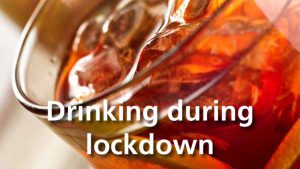15th June 2020

With the pubs shut, the Public Health Agency (PHA) is using Northern Ireland Alcohol Awareness Week (15-21 June) to encourage drinkers to take a closer look at their drinking habits at home and give themselves an “Alcohol MOT”.
Over three-quarters (79%) of adults here drink alcohol so the PHA and Northern Ireland’s five Drug and Alcohol Coordination Teams (DACTs) are asking people, in the absence of pub measures, to check how much they have been drinking at home with the Alcohol MOT on www.drugsandalcoholni.info/mot
Michael Owen, Regional Lead for Drugs and Alcohol at the PHA, said: “Many of us enjoy a drink, but we need to remember that alcohol is a powerful drug that can seriously damage your health, and also have a negative impact on those around you. It’s particularly important at this time, as people are drinking at home, to pause and think about how much you drink.
“The Alcohol MOT tool offers the opportunity to learn more about the number of units you are drinking and highlights whether or not you are putting yourself at risk, and directs you to advice on reducing your alcohol intake.”
The UK Chief Medical Officers’ guidelines state that for both men and women to keep the risks from alcohol low, it’s safest to drink no more than 14 units a week. So get to know your units. For example, a small glass of wine can be just over two units, and a measure of spirits can be around one and a half units. If you are pregnant or think you could become pregnant, the safest approach is not to drink alcohol at all, to keep risks to your baby to a minimum.
It’s also very important, if you drink as many as 14 units, to spread them out over three or more days and have several alcohol-free days a week.
In a pub or restaurant it can be easier to keep track of how much we’re drinking as accurate measures are used, but with these businesses currently closed, people are more likely to ‘free pour’ at home and fill the glass a bit more than we might get from a measure when we’re out, so the number of units is greater than we think.
Michael continued: “Think about how much you are pouring and try your best to measure out your alcohol, enabling you to keep better track of your units. It’s also very important to have several alcohol-free days during the week. Plan these out too so you can keep check on them.
“Remember, being intoxicated could be putting you and others at risk, as your judgement will be impaired and you may not be able to follow the social distancing and hygiene practices that are required to help protect you from coronavirus.
“Many people might use alcohol to relax, but, instead of helping us to cope, excess amounts can have both an immediate and long-term negative impact on our lives.
“In the short term, the undesirable effects of drinking too much can include symptoms such as vomiting and hangovers. However, more serious risks from drinking heavily can include damage to vital organs and falls or accidents that can result in injury.
“Drinking too much can also affect our judgement, leading us to do things we wouldn’t otherwise do and that we might regret later. These can include unplanned sexual activity, relationship difficulties and getting into violent situations.
“It is therefore important that people start to understand their drinking behaviour and explore their relationship with alcohol.
“Small changes can make a big difference.”
Alcohol Awareness Week top tips:
· Understand how much you’re drinking by taking the alcohol MOT – www.drugsandalcoholni.info/mot
· learn how many units are in your chosen drink – visit www.drugsandalcoholni.info and download the ‘Know Your Units’ app;
· when drinking at home try to use a measure if you can and don’t over-pour – if you have any kitchen measuring tools, these might help you;
· always look after yourself and know what your limits are;
· have several alcohol-free days each week;
· have something to eat before you start drinking to slow down the absorption of alcohol;
· alternate each alcoholic drink with a non-alcoholic drink, for example, water or a soft drink;
· take frequent breaks from drinking to give your body time to recover;
· never add drugs into the mix.
Visit the PHA and NIDACTS social media pages more tips and advice during Alcohol Awareness week:
· www.facebook.com/publichealthagency
· www.twitter.com/publichealthni – @publichealthni
· www.instagram.com/publichealthni – @publichealthni
· www.facebook.com/NIDACTS
· www.twitter.com/NIDACTS




